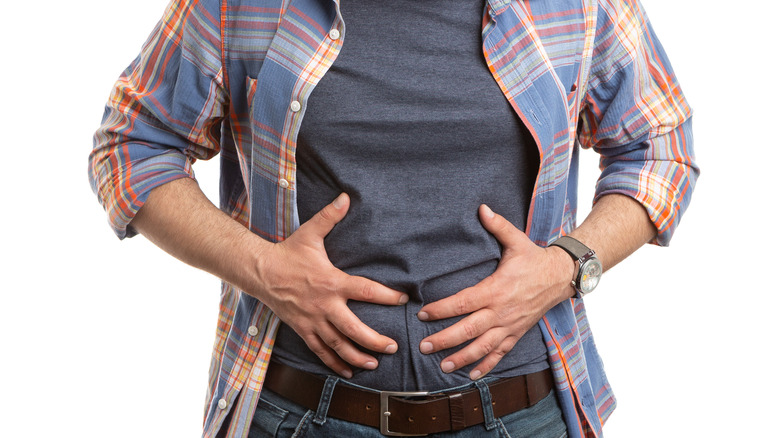How To Treat Abdominal Distension At Home
When one's abdomen protrudes outwards beyond its typical size, it's easy to assume the underlying cause is due to a buildup of gas (via Cleveland Clinic). Otherwise known as abdominal distension, the cause for this bodily reaction is not entirely clear, reports the Mayo Clinic. Yet, roughly 40% of the population is said to experience bloating and abdominal distension. Abdominal distension may be experienced in the short term or may be chronic and ongoing for others.
Gas can certainly be one cause of the condition, particularly for those with gastrointestinal issues such as irritable bowel syndrome (IBS), celiac disease, or certain food intolerances, among other conditions. However, abdominal distension has also been linked with pregnancy, water retention related to menstruation, bowel obstructions, inflammation, constipation, fluid buildup in the abdomen, and more. For some people with gastrointestinal disorders, hypersensitivity to their perception of abdominal distension may exacerbate symptoms for those who also experience anxiety or depression.
For those who experience the discomfort of abdominal distension, there are some at-home remedies to help alleviate symptoms.
Self-help for abdominal distension
In some instances, a swollen abdomen may have a temporary circumstantial cause, such as having eaten a big meal. In these cases, time may be all you need as the body goes to work breaking down food. To aid your body in its digestive efforts, try eating smaller meals or taking smaller bites while chewing more slowly to help reduce the chances of abdominal distension (via Healthline).
Eating more slowly can also be a helpful treatment for abdominal distension if the cause is related to gas buildup. By slowing the rate at which we eat, we're swallowing less air, thereby decreasing the likelihood of gas. In addition, steer clear of carbonated drinks like soda, and stick to sipping your beverages rather than using a straw.
Sometimes, however, the best treatment is avoidance altogether. If possible, try and limit foods known to trigger abdominal distension, such as broccoli, beans, or dairy if you are lactose intolerant. For those with certain health conditions, boosting one's fiber intake while lessening one's sodium consumption may also be helpful, in addition to rest and stress reduction. Alternatively, be sure you're drinking plenty of water and consider taking digestive enzymes or probiotics prior to eating (via Cleveland Clinic).
When to consult your physician
If at-home treatment methods aren't doing the trick, medical treatment options may be available depending on the cause of one's abdominal distension. For example, your physician may encourage the use of diuretics to alleviate fluid buildup (per Healthline). In some cases, however, a fluid removal procedure may be required.
While a distended abdomen is not usually cause for concern and often subsides on its own, there are cases in which it's advised to seek medical care. This includes if your abdomen continues to grow; if you experience additional symptoms including nausea, vomiting, or fever; or if you have excessive diarrhea or blood in your stool, according to Healthline. You should also seek medical care if you are experiencing severe abdominal pain, if you cannot identify a clear cause for chronic abdominal distension, or if you are unable to eat food or drink fluids for upwards of eight hours (via Cleveland Clinic).



